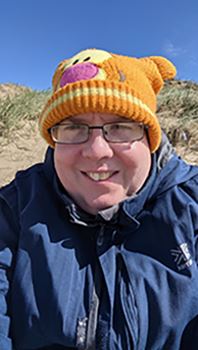What the Pandemic Taught Me 3 - LJMU Together
The COVID-19 pandemic has changed all of us. Life seems more fragile. Things we took for granted have disappeared, like holidays! Other things, many unwanted, have taken their place, like social distancing and masks.
Many of us may feel that life has got worse, for a while at least. But now that we start to reset and regain our independence, what have we learned? And where will that learning take us? Will we just fall back into old routines? Or will we be wiser and take the positives?
We’re encouraging colleagues to share what they’ve learned as we all reflect on where we are and what we’ve been through.
Whatever you think you’ve learned – either about yourself or the world around us - please share it with us at ‘What the pandemic taught me’ at press@ljmu.ac.uk. Here are your latest contributions ....
Andy Keegan, Reward, Recognition and Engagement Manager

Initially for me it was a little different working from home maybe exciting even. That quickly changed to being at home with a full house of kids and the dog, trying to find a quiet place or even somewhere to set up the laptop. So much so I made my own standing desk (Ironing Board!!). We adapted, we all did, we pulled together and got the job done.
Working on the implementation of the new wellbeing strategy during this period has reinforced just what a great community of staff we have.
I think what I have learned really is that together we can rise to challenges and that will not only help us as an organisation but as individuals. Unfortunately I experienced a Covid related bereavement, which hit us hard as a family, but also brought us all closer together.
Dr Calvin Xin Liu, Senior Lecturer in International Relations and History
 The pandemic has taught me how fragile our way of life is and how unredeemable once it’s disrupted. As an Asian ethnic it never gets more astonishing how the previously amicable relationships between nations have broken down overnight-sometimes just for equivocal claims; and how easy it is for people to hate ordinary others for no reasons.
The pandemic has taught me how fragile our way of life is and how unredeemable once it’s disrupted. As an Asian ethnic it never gets more astonishing how the previously amicable relationships between nations have broken down overnight-sometimes just for equivocal claims; and how easy it is for people to hate ordinary others for no reasons.
We have no doubt that health and safety should be prioritised as we are still amid a global health crisis. However, when we think seriously about human values and dignity, health and safety is certainly not the words that catch all. Some state governments, when they pontificate about covid control and threaten to criminalise their citizens returning from pandemic hotspots, really give me a déjà vu that we are perhaps back to the haunting past of abysmal solitude and blatant discrimination despite the unprecedented human catastrophes we’ve watched in the last tumultuous century. How short the human memory is, and how long it takes for us to rebuild? I can never underestimate the doom, as prospects of the world never get bright just because we say it is bright.
Michelle McManus, Head of Criminal Justice, School of Justice Studies
 I have very mixed feelings when I reflect on the last 18 months of Covid-19. From a personal perspective, it has possibly saved my mum after she was diagnosed with Stage 4 cancer and given only a few months to live. Fortuitously, her treatment isolated her in hospital for five weeks, protecting her from the usual colds and bugs of human contact. So, I am very aware of how lucky we are that we are still together. It has made me appreciate family so much more. Just sitting in the garden watching my girls play with her sat beside me just feels me with joy!
I have very mixed feelings when I reflect on the last 18 months of Covid-19. From a personal perspective, it has possibly saved my mum after she was diagnosed with Stage 4 cancer and given only a few months to live. Fortuitously, her treatment isolated her in hospital for five weeks, protecting her from the usual colds and bugs of human contact. So, I am very aware of how lucky we are that we are still together. It has made me appreciate family so much more. Just sitting in the garden watching my girls play with her sat beside me just feels me with joy!
I feel more comfortable in my own home too with the family finding new ways to connect, over games of Uno (We are very competitive!), movies and sing-a-longs.
My academic work – in safeguarding, child exploitation and agency response - has highlighted the ‘perfect storm’ that Covid-19 has created for many vulnerable families. Many of my projects highlight the trauma of lockdown with professionals struggling to keep sight of them. The medium and long-term effects are still unknown, but my reflections on this have motivated me to try and bring my research to life in practice and policy in regards how we can best respond to these vulnerable groups and not expect them to follow the expected ‘recovery trajectory’. I am hoping we have learnt to be patient, be more understanding, and consider other peoples life experiences and expectations before judging. And I certainly agree with the statement ‘be kind’. I will try, personally and professionally, to ‘be kinder’.
Michael Humphreys, Development Officer, Corporate Communications

I have never worked from home but found the time I would have travelled to work to be the most enjoyable, sat in the garden eating breakfast a moment of peace and well-being.
WFH wasn't so much about finding work to do but to prioritise the admin that always needed doing. As the pandemic grew worse the university invested in its own track and trace system, the team came together performing student wellness checks, tracking campus movements and arranging for room cleanings, tracking cluster outbreaks. Working with security, estates and cleaning crews to ensure we all worked in a protected safe environment.
All this time at home has meant rethinking activities with the kids. Our living room turned into a cinema, we introduced them to 80s movies, we realised baking sourdough was not our thing and would just buy it. We are looking forward to returning to our favourite places around the country especially Bolton Abbey...highly recommend a visit!


